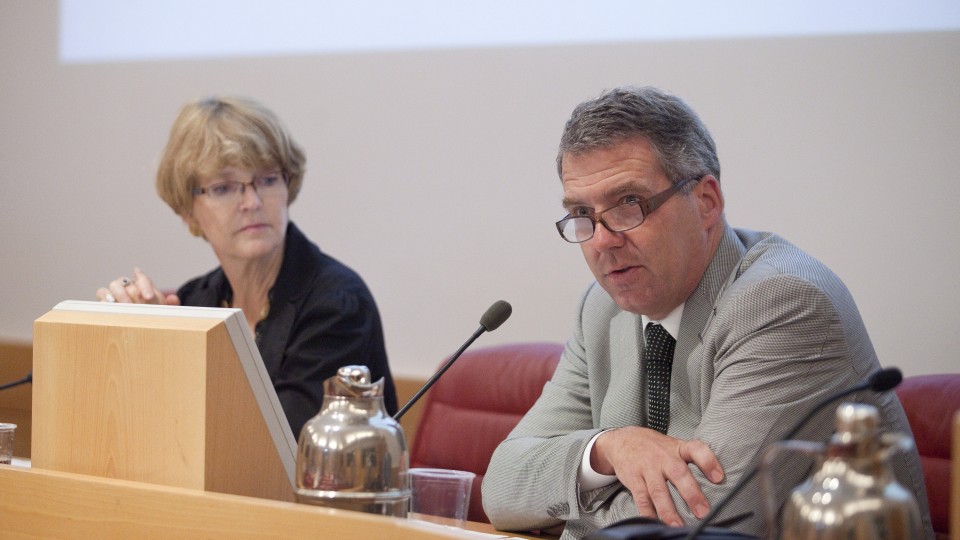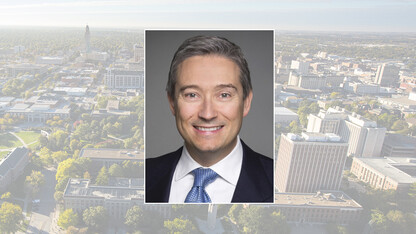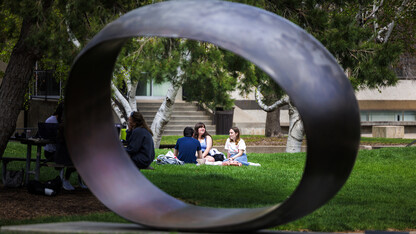· 5 min read
Milliken leaving NU to become CUNY chancellor

University of Nebraska President James B. Milliken informed the university community Jan. 15 that after nearly a decade as NU’s president, he will leave Nebraska to become the next chancellor of the City University of New York, the nation’s premier urban public university.
The CUNY Board of Trustees unanimously approved Milliken’s appointment in a special meeting. Milliken will begin his tenure at CUNY no later than June 1.
“As a native Nebraskan, serving as president of the University of Nebraska has been one of the greatest privileges of my career,” Milliken said. “I am incredibly proud of what’s happening here — which is a testament to the quality of our outstanding faculty, students and the leadership of many. Today the University of Nebraska is doing more than ever to provide students in Nebraska and beyond with an affordable, excellent education; to conduct research in areas critical to people in Nebraska and around the world; and to help people in communities across the state live healthier, more productive lives. This university is poised for great things. While it is difficult to leave, I am deeply honored to have the opportunity to serve as the chancellor of CUNY, a university that plays such a vital role for the nation’s largest city and the entire country.”
CUNY is the third-largest university system in the United States, with 24 campuses across New York City and 270,000 degree-credit students and 218,000 adult, continuing and professional education students. CUNY’s student body is one of the most diverse in the nation, with 40 percent of undergraduates having been born outside the United States. Twenty percent of the university’s undergraduates are the first in their families to attend college. The chancellor is CUNY’s highest-ranking official, with the campus presidents reporting to him or her.
“I know I speak for my colleagues on the Board of Regents when I say that we are happy for President Milliken and his family as they start a new chapter of their lives at CUNY, but we are also sorry to lose them,” said Tim Clare, chairman of the NU Board of Regents. “President Milliken has been an extraordinary visionary for the University of Nebraska. His leadership, coupled with his tireless work ethic and magnetic personality, has taken the University of Nebraska to new heights that have benefitted not only the university, but also the entire state of Nebraska. We have done a great deal to fulfill our mission as a leading 21st-century university and our trajectory puts us in a strong position to continue this momentum. We thank J.B. and Nana for everything they have done for the University of Nebraska and the state. They have made a difference in so many peoples’ lives, and we wish them nothing but the best.”
“When J.B. returned to our home state, he committed himself to raising the University of Nebraska to an even higher level — building a global reputation for Nebraska’s leadership on strategic priorities for the 21st century,” said Jeff Raikes, a Nebraska native and CEO of the Bill and Melinda Gates Foundation. “He has been a transformational leader, and Nebraskans can be truly proud of his accomplishments and the momentum he’s built for the university. We all look forward to how this Nebraskan will next shape our world.”
Milliken, the first Nebraskan and the first University of Nebraska graduate to become president of the university, has served in his current role since 2004. When he became president, he worked with the Board of Regents and university leadership on a strategic planning process that has resulted in unprecedented success for the university, including:
Expanded access for Nebraskans, including record investments in need-based financial aid. Affordable access has been Milliken’s highest priority, and tuition rates on all four NU campuses are well below the peer averages. NU’s tuition assistance program, Collegebound Nebraska, now guarantees full tuition coverage for nearly 6,700 students. Overall, more than half of NU undergraduates receive some form of grant aid that does not have to be repaid.
Growing enrollment, including a 20-year high this fall of 50,705, with ambitious goals for continued growth to help produce a highly talented workforce for Nebraska.
Record levels of research funding in areas important to Nebraska, including water and agriculture, cancer, early childhood education, public health, engineering, energy, information technology and others.
Significant physical expansion of the four campuses.
A highly successful capital campaign, whose priorities Milliken developed in consultation with the campuses. The campaign has already raised more than $1.5 billion – well over the original goal of $1.2 billion – and will conclude at the end of 2014. Last year donors gave a record $237 million to the university.
Creation of a number of university-wide institutes that are mobilizing the diverse resources of the four campuses: the Robert B. Daugherty Water for Food Institute, the Buffett Early Childhood Institute and the Rural Futures Institute.
A new level of commitment to global engagement, which has resulted in record enrollments of international students and new strategic partnerships in China, India, Brazil and other key countries.
A strengthened commitment to public-private partnerships, including Nebraska Innovation Campus, which is leveraging the University of Nebraska-Lincoln’s research strengths in food, fuel and water; a 70-acre expansion of the University of Nebraska at Omaha campus to provide for growth and private-sector engagement; the new Fred & Pamela Buffett Cancer Center at the University of Nebraska Medical Center; and South Campus at the University of Nebraska at Kearney, which will provide expanded space for private and university activities. Innovation Campus and the cancer center both received investments from the state which have been leveraged with significant private giving.
Expansion of the university’s distance learning programs, including creation of the University of Nebraska Online Worldwide, which is expanding access to education to even more students.
Clare said a national search will be conducted for the next president of the University of Nebraska. In accordance with university policy, the NU Board of Regents will appoint an advisory committee to assist in the search. The size and composition of the advisory committee will be determined by the regents, but it will include representatives of the principal constituencies with which the president interacts.
Clare said an interim NU president likely will be designated by the regents at a later date.







